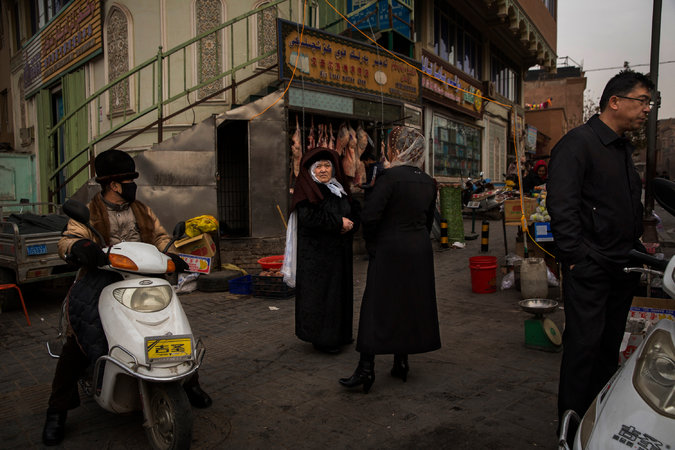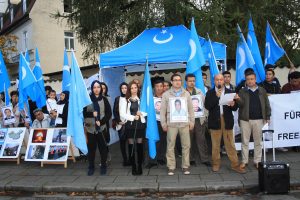The illusion of human rights with “Chinese characteristics”

ANI, 13 December 2016

ANI — China lauds it’s whizz bang economic growth as evidence that the country is on the right track with the Chinese Communist Party (CCP) at the helm. Ironically, it also trots out its spectacular advancement as a reason why it can, indeed must, deny civil liberties to its citizens.
In a speech marking International Human Rights Day on 12 December, the US Ambassador to China, Max Baucus, called China to task over a lack of basic freedoms for its people.
Baucus began by highlighting detained lawyers being held without trial, before pointedly stating, “When I speak about human rights, I do so out of respect for China and for the dignity and worth of each and every Chinese person. I reject the notion of ‘human rights with Chinese characteristics’.”
Since assuming power, President Xi Jinping has launched an unprecedented crackdown, with lawyers, human rights advocates and journalists, among the main targets. Baucus continued, “The fact remains that the Universal Declaration, which China has adopted, makes clear the international standards covering how all countries should treat their citizens.”
For its part, China’s Ministry of Foreign Affairs issued its own statement to mark International Human Rights Day.
“Human rights are the lofty ideals of mankind, but there is no universally agreed path to human rights. In international human rights cooperation, countries must adhere to the purposes and principles of the UN Charter and basic norms governing international relations, respect each other’s sovereignty, independence and territorial integrity and discard politicization and double standards.”
In other words, China maintains it can forge its own pathway, and that others have no business poking their noses into its methods or standards. Its statement continued, “By aligning the universality of human rights with China’s national conditions, China has worked for the all-round and balanced development of people’s economic, social, cultural rights as well as civil and political rights, and embarked on a human rights development path with Chinese characteristics.”
China argues it is pursuing a “path with Chinese characteristics,” but Beijing is actually using this modifier to redefine universal rights. The truth is that there is a sharp disconnect between what China signed up to in the Universal Declaration and how it behaves.”Chinese characteristics” is a cop out because universal values must be just that, universal.
A statement from the European Union Delegation in China echoed many of the same points from the U.S. ambassador: “During the past year, we have been extremely troubled about the deterioration of the situation with respect to freedom of expression and association. This repression has led to the arrest, detention and conviction of human rights defenders, lawyers and others exercising rights such as freedom of religion or belief.”
Unfortunately, many countries avoid this issue, not wishing to upset Beijing who typically accuses others of “interfering in China’s domestic affairs, or even worse, of attempting to destabilize this great country,” as Baucus put it.
Tibet and Xinjiang are two prime examples of how China represses citizens. Indeed, Baucus gave an example. “China’s constitution states that “all nationalities have the freedom to use and develop their own spoken and written languages. So, I ask why Tashi Wangchuk, a Chinese citizen who is deeply interested in education, remains in jail for his peaceful advocacy of Tibetan language education.”
China has progressively closed down the teaching of the Tibetan language in schools and monasteries there. Instead, if it is appears in schools at all, Tibetan is taught in separate lessons as though it were a foreign language. Tashi’s crime was to file a lawsuit to compel the authorities to provide more Tibetan education, including for his two nieces.
China has aggressively cut back the teaching of ethnic languages and promoted Mandarin to speed up assimilation of ethnic groups. Thus, the literacy rate in Tibetan has likely dropped below 20% and continues to fall further. While many applaud the use of Chinese in schools – the national university exam is administered in Chinese, for example – it does mean a loss of ethnic identity, which is perhaps what Beijing is seeking.
While the authorities welcome tourists to visit Tibet to boost the local economy, it is extremely leery of foreign influence. A source told ANI that there are currently only approximately 20 foreigners allowed to live in Tibet, and that about 40 “minders” are permanently assigned to monitor them.
Or what of Xinjiang, a restive province three times the size of France in northwest China that is home to more than 10 million Uighur Muslims? News emerged on 24 November via the Global Times that all residents in Xinjiang must hand in their passports to local police stations for “examination and management”. This mandate was apparently first publicized in October.
The newspaper quoted a police officer who said, “Anyone who needs the passport must apply to the police station.” Any who refuse to do so would face the prospect of not having newspapers issued? Oddly, the Global Times later removed the story from its website.
Earlier news arrived in June that Kazakh residents of a border district in Xinjiang had to submit DNA samples, fingerprints, voiceprints and a 3-D image to apply for travel documents. This shows to what lengths the authorities are going to control the movement of people in the province.
Muslims Uighurs have for long complained of discrimination against them. In an effort to parlay Islamic extremism, Wang Zuoan, chief of the State Administration for Religious Affairs, said at a recent national congress for Muslims in Beijing, “Muslims’ beliefs and customs should be respected, but religious interference in politics, justice or education is intolerable.”
Interestingly, China’s Muslims are also being directed to “always keep to the direction of developing Islam with Chinese characteristics”. Unfortunately, an atheist communist regime and Muslim practice are mutually incompatible, making a mockery of such statements. It seems every aspect of life is to have “Chinese features”, with the CCP the lone arbiter of what constitutes this definition.
Beijing routinely says such measures are intended to “maintain social order”. More truthful would be the explanation that it is to maintain the “socialist order” by aggressively targeting any threat to the CCP. This raises the old chestnut, is China’s repression of Islam causing greater dissent and Islamization (as many outsiders argue), or is the threat migrating into China from outside its borders (as China claims)?
Another source, a one-time resident in Urumqi, spoke to ANI of an increased security presence there since 2011. There are checkpoints everywhere in Urumqi, but more so in the city center and in Uighur-majority areas such as the southern part of the city. With Han living mostly in the north, there is little social mixing of Muslim and Han Chinese outside of schools, universities or places of employment. This cultural divide is becoming more pronounced, and there is a dominant mindset that Han should legitimately be afraid of Uighurs.
The average Uighur is critical of Islamic terrorists, because such violent hardliners make life more difficult for everyone else. They are upset about terrorism, but they are also upset about the Han’s repressive reactions that have led to greater impositions.
The source told ANI that there has been a hardening of resolve to pursue Islam, due in large part to Han persecution. Islam has become a stronger part of their identity, with their religion and language setting them apart from the Han. Headscarves were not traditionally a part of Uighur culture, but women are now wearing them more than ever.
Fasting is also taken more seriously. However, Uighur civil servants are forbidden to fast. Indeed, to gain such government employment, one usually has to be a card-carrying member of the CCP. This creates problems because a Muslim would essentially have to deny key tenets of their faith to give their pledge of loyalty to the CCP, an avowedly atheist organization.
The standard CCP oath reads: “It is my will to join the Communist Party of China, uphold the Party’s program, observe the provisions of the Party Constitution, fulfill a Party member’s duties, carry out the Party’s decisions, strictly observe Party discipline, guard Party secrets, be loyal to the Party, work hard, fight for communism throughout my life, be ready at all times to sacrifice my all for the Party and the people, and never betray the party.”
Returning to China’s statement commemorating International Human Rights Day, it continued, “China has protected the lawful rights of vulnerable groups. The Chinese government gives priority to the development of ethnic minority groups and regions, and has adopted many special policies and measures to help ethnic minorities fully participate in political decision-making, share in the achievements of economic and social progress, and enjoy broad freedoms in inheriting and developing their traditional cultures and religious beliefs.”
Such sentiments ring hollow, especially for Tibetans and Uighurs. While there have been significant advances in criteria such as life expectancy, healthcare, diet and education for citizens of Tibet and Xinjiang, sources informed ANI of widespread despair as they have been largely left behind in national economic growth. There is active discrimination with hand searches and intrusive actions such as electronic devices that suck info from their mobile phones for analysis.
Furthermore, the Chinese government can never admit to failings in its approach, and so a stalemate is reached. Instead, the government likes to squash unrest and maintain a veil of silence over what is happening in these regions. That suits the Han perfectly as they prefer to remain in ignorance.
“Unless something changes in how they work together, it’s not going to get much better,” the source said.
Meanwhile, China refuses to budge from its self-deception. “Standing on the vast land of 9.6 million square kilometers, nourished by its 5,000-year history and culture and backed by the cohesion of 1.3 billion people, China has a vast stage, profound historical strength and inexhaustible driving force to pursue the path of human rights development with Chinese characteristics,” it trumpeted.
With China espousing such things as this – “Thanks to the unremitting efforts over many years, human rights have been fully protected in China and our human rights cause has reached a new phase” – one must ask how disingenuous the regime really has become.
(This story has not been edited by Business Standard staff and is auto-generated from a syndicated feed.)

